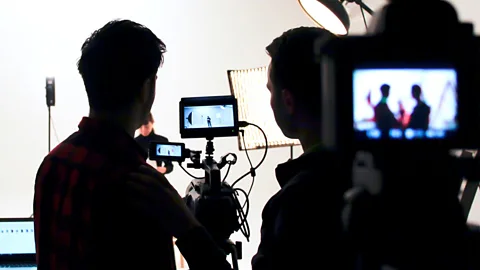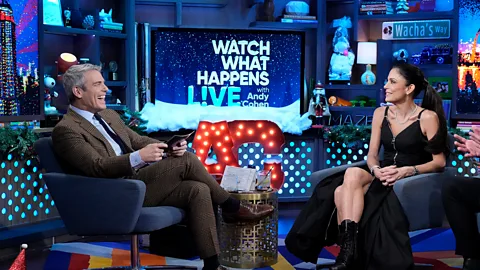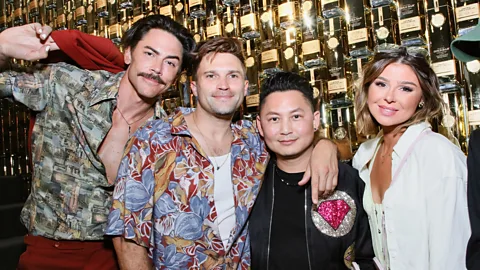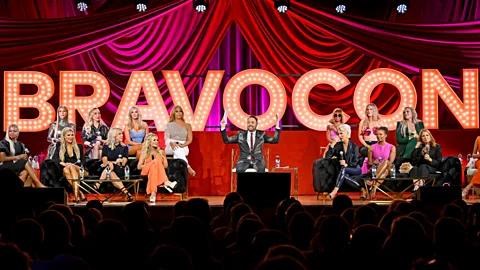What are the legal rights of reality TV stars, really?
 Getty Images
Getty ImagesNew Bravo lawsuits from Leah McSweeney, Caroline Manzo and Rachel Leviss are forcing a look at the legal rights of reality TV stars.
When reality TV stars file legal complaints about their treatment, there's one kind of backlash viewers can depend on: eye-rolling fans flooding the comments to say that these cast members knew what they were getting into. "You've seen the show – what did you expect?" is a common refrain. So are accusations that these stars are "biting the hand that feeds them" – enjoying the spoils of reality TV fame and then turning on their employers when they're unhappy with how they're portrayed. But a recent flood of allegations from reality stars describe issues that go far beyond public perception – and raise serious questions about the legal protections they're afforded.
Last summer, Housewives alum Bethenny Frankel kicked off the conversation about reality stars' rights by petitioning fellow stars to join the SAG-AFTRA strike and calling for a reality TV union. "Networks and streamers have been exploiting people for too long," she said, citing the cast members' rights to residuals, among other issues. The following month, entertainment lawyers Bryan Freedman and Mark Geragos sent a letter to NBCUniversal's general counsel alleging "grotesque and depraved mistreatment" and warning that "a day of reckoning" was coming for its reality TV productions. Their accusations included "deliberate attempts to manufacture mental instability by plying cast members with alcohol while depriving them of food and sleep" and "covering up acts of sexual violence".
A spokesperson responded at the time that "NBCUniversal is committed to maintaining a safe and respectful workplace for cast and crew on our reality shows" and that, "if complaints are brought to our attention, we work with our production partners to ensure that timely, appropriate action is or has been taken." Later that month, Freedman told Variety that he has spoken with "roughly 50 reality show cast members" about similar mistreatment.
Since that letter, there's been a steady stream of legal complaints from current and former reality TV stars – many of them containing complaints of discrimination, retaliation and sexual harassment. Caroline Manzo, a former Real Housewives of New Jersey star, filed a lawsuit in January against employers including Bravo and NBCUniversal with allegations including sexual harassment and sexual battery. Real Housewives of Beverly Hills alum Brandi Glanville sent her own legal letter in February accusing Bravo host Andy Cohen of sexual harassment (Cohen has since apologised for the incident in question on Twitter). Former Bravo cast members Leah McSweeney (Real Housewives of New York) and Rachel Leviss (Vanderpump Rules) each filed their own lawsuits in March: McSweeney's is against employers including Andy Cohen and Bravo and alleges both sexual harassment and discrimination related to her alcoholism and mental health disabilities; Leviss's is against fellow cast members Ariana Madix and Tom Sandoval and alleges revenge porn, among other charges.
While Leviss does not directly name Bravo as a defendant, the lawsuit does accuse the production of revoking access to a mental health professional during filming and encouraging her to drink "much more heavily" in the belief that it would "make for better television." A representative for Cohen told BBC Culture that McSweeney's allegations against him are "completely false". NBCUniversal, Bravo and Shed Media have not responded to BBC's numerous requests for comment.
 Getty Images
Getty ImagesThe Real Housewives and alcohol
The allegations concerning alcohol are among the least surprising for longtime reality TV fans – The Real Housewives of New York, Leah McSweeney's former show, has become especially well-known in recent years for its depictions of intoxication and outrageous behavior. There have been growing concerns that production is either deliberately encouraging this kind of behaviour or refusing to step in when things get out of hand. These concerns were crystallised in an October investigation from Vanity Fair that detailed months of conversations with current and former Housewives, one of them Leah McSweeney, about the off-camera details of the binge-drinking seen by fans. Numerous Housewives confirmed a pervasive sense that their work environment depended on alcohol consumption and cited instances of producers declining to intervene when things got out of control. McSweeney's recollections from her time filming include waking up "in her own urine", "still drunk from the night before" – and that when she had to have her car pull over to throw up, production rushed over "not to help, but to document it."
"People saying that [Leah McSweeney] signed up for this – they're saying that it's okay that Bravo does this to these women," McSweeney's lawyer, Gary Adelman, told BBC Culture. "That it's okay to violate these women's rights, it's okay to do things that don't ordinarily happen on other film or TV sets. And I don't believe it is."
McSweeney's lawsuit concerns her time both on Real Housewives of New York and Real Housewives: Ultimate Girls Trip. Prior to her appearances on these shows, McSweeney says she had been sober for nearly nine years, breaking her sobriety roughly five months before filming began. She also says that production was aware of her alcohol use disorder but that she was nonetheless subjected to a "workplace culture that uniquely depended on pressuring its employees to consume alcohol".
 Getty Images
Getty ImagesHer lawsuit accuses production of failing to provide reasonable accommodations to allow her to attend AA meetings, discriminating against her on the basis of her alcohol use disorder and mental health disabilities and retaliating against her both for attempts to stay sober and for raising concerns about her treatment. The lawsuit also characterises the actions of the defendants (Shed Media, NBCUniversal Media and Bravo, among others) as those of a "covert, illegal enterprise" operating in violation of the Racketeer Influenced and Corrupt Organizations (RICO) Act, accusing the defendants of having "conspired" and "jointly agreed" to violate various laws for the purposes of creating "dramatic pseudo-reality television." Shed Media, NBCUniversal and Bravo have not responded to the BBC's requests for comment on these specific allegations.
Those who suggest that reality stars are simply reaping what they've sown tend to operate with the assumption that reality TV sets should, by nature, be permitted to operate with different guidelines than other work environments – that things such as pressure to drink and keeping the cameras rolling in increasingly dire situations are okay by virtue of tradition, an established norm within the world of reality TV production. But that's exactly what lawsuits like McSweeney's are now trying to dispel.
"[Leah] should be entitled to the same protections as anyone else who's walking into a law firm, or a restaurant or anyplace else for employment," Adelman says. "The law is set up to protect employees, and there should not be an expectation that they're allowed to violate those employment laws simply because it's a reality show."
More like this:
Alleged sexual assaults on reality TV sets
While Bravo shows have been the subject of the most legal attention in recent months, they aren't the only network whose reality contestants have started fighting back about alleged treatment during filming. Three former contestants from Netflix's Love Is Blind – Jeremy Hartwell, Tran Dang and Renee Poche – have all filed lawsuits over the past two years targeting both the network itself and production companies Delirium TV and Kinetic Content, with allegations of inhumane working conditions, false imprisonment, intentional infliction of emotional distress, gross negligence and more. Dang's case contains a particularly troubling allegation of sexual assault occurring during filming, claiming that producers knew about the alleged assault but did not act to prevent it. A joint statement issued by Kinetic Content and Delirium TV denied Dang's allegations and claimed that she "never informed the producers of any alleged wrongdoing of any kind."
Allegations of sexual assault or misconduct occurring on-camera or during production are a pervasive theme in the reality TV landscape, with highly publicised incidents occurring on Below Deck Down Under, Gran Hermano (Spain's version of Big Brother), The Challenge, Bachelor in Paradise and, in an ongoing set of cases, So You Think You Can Dance. Real Housewives star Caroline Manzo's lawsuit also concerns allegations of sexual assault and harassment, describing an incident during Real Housewives: Ultimate Girls Trip filming in which she alleges fellow cast member Brandi Glanville "forcibly squeezed Manzo's cheeks together and thrust her tongue in Manzo's mouth", then "groped, grabbed, and forcibly fondled Manzo's vagina and breasts" while Manzo cried for help. The lawsuit claims that Glanville's actions were "caused by and allowed to happen by Defendants": despite producers allegedly "listening to the interaction on audio", Manzo says no one "took any other action to intervene and stop the sexual assault".
"I get it," Manzo's lawyer Derek Smith told BBC Culture. "Shocking reality television brings the ratings. However, human decency requires that we put limits on that shocking behavior. We all have the right to work in an environment that is free of sexual harassment. People like Ms. Manzo should never be sexually harassed in order to get a ‘good' shot. A production company's creative rights should never trump a cast member's safety."
As in McSweeney's lawsuit, alcohol plays a front-and-center role in Manzo's claims, with claims that production intentionally plied Glanville with alcohol knowing her history of sexual harassment and that another incident was "likely" to occur. The lawsuit notes that, during filming, production was "constantly supplying the castmates with alcohol": "if one wanted alcohol at 9 am at breakfast, they could have as much alcohol as they wanted… the more drunk the ‘housewives' were, the more outrageous the behaviour and the higher the ratings."
 Getty Images
Getty ImagesThe path forward
While there are still many reality TV programmes on which alcohol plays a central role, others have been quietly adjusting their alcohol policies for years, often in response to issues of legal liability. Bachelor in Paradise and The Challenge instituted new alcohol limits after allegations of sexual assault during production: The entire Bachelor franchise now operates by a two-drink per hour limit, while The Challenge has producers on hand to cut cast members off if they at any point appear over-served. Contestants from Netflix's Too Hot to Handle, BBC's The Traitors, and ITV's Love Island have all reported strict "one to two drink" limits during filming, and series such as Love Island and The Challenge have also launched more stringent mental health protocols. Love Island's was implemented in the wake of the deaths by suicide of two former cast members and former host Caroline Flack between 2018 and 2020. Love Is Blind has never shared an official alcohol policy, despite alcohol-related allegations from former contestants.
In September, NBCU entertainment chairman Frances Berwick sent a message to production partners indicating a growing awareness of alcohol-related concerns on reality TV sets. The message, as reported by Vanity Fair, introduced a new requirement to "deliver an expanded alcohol-related training to the cast, crew, and production team". It also mentioned "enhanced mental health support, including on-set psychological support during and after filming and at reunions, as well as care after filming."
Smith agrees with McSweeney's lawyer Adelman: What these lawsuits are getting at are a very basic enforcement of employment laws regulating the workplace. Though some Bravo stars' lawsuits do include complaints of emotional manipulation or dissatisfaction with storylines that have played out from the show – complaints that fans are most likely to dismiss as occupational hazards – lawsuits like McSweeney's and Manzo's are addressing issues of protection during filming itself.
"We would like [reality TV productions] to abide by these simple rules," Smith says. "Don't get the cast members drunk. Don't encourage case members to sexually harass others. Don't continue to hire people with a history of sexual harassment. Don't put ratings and profit over people's safety."
This is the underlying fear of many who criticise current legal actions – that "good" reality TV (and the ratings and profit that come with it) can't exist without the drunken antics and shocking moments the genre has become known for. But this fear neither negates reality stars' rights to a legally compliant workplace nor has much grounding in what fans actually tend to appreciate seeing on reality TV.
Vanderpump Rules's "Scandoval", perhaps the biggest reality TV sensation of the last decade, involved the real-time reveal of a longstanding affair between two cast members and saw the show reach its highest-ever ratings, no alcohol-fueled blowouts required. Love Island and The Bachelor have enjoyed intense fan fervour even after they imposed alcohol limits. And an August episode of Below Deck Down Under in which producers stepped in on-camera to remove a highly inebriated Luke Jones from a sleeping cast member's bed suggested that, even in scenarios where things may get out of control, fans would vastly prefer seeing producers step into a scene that makes them question why they didn't.
Regardless of anyone's personal preference for a certain brand of drama, reality TV productions may soon find that certain established practices are not worth the legal liabilities they create. "There are more lawsuits coming and there are more people who are going to speak out," Adelman says. "It doesn't matter what people say or think – that Andy's a good guy, or that you should expect to drink, or that you should expect this behavior. What's going to matter is what the law thinks of it. And we believe the law thinks this is wrong."
If you liked this story, sign up for The Essential List newsletter – a handpicked selection of features, videos and can't-miss news delivered to your inbox every Friday.
